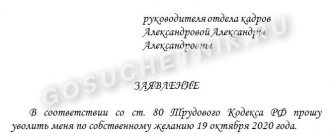Free legal consultation over the Internet 24 hoursLawyer on housing issues in St. Petersburg. Free legal consultation on labor disputes.
5/5 (2)
How to write a document correctly
The standard form for writing a complaint has not been approved, so it is drawn up in any form.
In this case, the document must contain certain information:
- The so-called “header” is placed in the upper right corner of the sheet. This part indicates: the full name of the institution where the document is sent, the full name and position of the director, since it is necessary to contact him, and the personal data of the person filing the complaint. If we are talking about a collective appeal, information about the person representing the entire team is specified;
- the name of the document is written in the middle of the sheet - “Complaint”;
- The “body” of the document contains the following information: the full name of the employer, its organizational and legal form, the reason for the application is specified, and the offenses committed by the employee are listed, the date of the violations. In addition, information that is directly related to the current situation is indicated;
- demands are listed - to stop the development of a conflict situation, take legal measures, etc.;
- the appendix lists copies of documents that confirm the facts stated in the complaint;
- Next, the date of the appeal is recorded, and the signatures of the applicant or applicants are affixed (if we are talking about a collective complaint).
Reasons for writing
Most often, complaints against employees are received in situations where they commit the following offenses:
- treat other employees with disrespect, are rude, show rudeness, use insulting language towards employees, their families, comrades, etc.;
- use obscene language in communication to humiliate other people;
- make threats;
- allow assault;
- treat female employees with disrespect and harass them sexually;
- force other employees to perform duties that they should not do, or this is not provided for in the employment agreement;
- do not comply with labor safety rules at work;
- sabotage the production process;
- do not follow orders from management, engage in arbitrariness;
- are engaged in fraud related to late payment of wages, reduction of their size, non-payment of bonuses (such offenses are committed by the management of the enterprise).
Watch the video. How to write a complaint correctly:
Help develop additional skills
Soft skills or flexible skills are no less important than professional ones. This is especially necessary when working with clients. The ability to correctly present information, understand what customers want and be easy to communicate influences the opinion of customers no less than the ideal solution to problems.
These useful skills can be developed. Trainings, master classes, conversations and discussions will come to the rescue. But if an employee is absolutely uncommunicative, avoids any communication and does not consider this an obstacle to work, there is no point in forcing him.
Feeding method
There are several ways to send a complaint to management about a colleague:
- bring it in person. In this case, the document is registered and an entry is made in a special accounting book;
- send by registered mail with delivery receipt. This way you can confirm that the document was actually sent to the administration;
- use other possible methods, if permitted by the regulations of a particular government agency or legislative acts.
A complaint can be submitted to the head of the enterprise or to a regulatory authority. By the way, such an appeal can be simultaneous; the law does not prohibit this.
Note! When choosing a delivery method, consider that a personally delivered complaint will be reviewed as quickly as possible, unlike a letter, which will take a certain time to be delivered.
Is it possible to write a complaint to the inspectorate anonymously?
The Labor Inspectorate is a government body that is called upon to sort out difficult situations in the relationship between an employee and an employer, therefore, like any other government agency, it does not accept anonymous complaints.
To maintain confidentiality, you can directly include a clause in the complaint requesting that information about the complainant not reach the employer.
In addition, it must indicate the applicant’s contact information, his address and telephone number for feedback.
According to the law, labor inspectorate specialists must take the necessary measures to resolve the conflict and, based on the results of the investigation, send a response to the originator of the complaint.
How to write a collective complaint
When filing a complaint from a team of employees, you must adhere to the following rules:
- Before composing such an appeal, talk to people, clarify everyone’s opinion, and determine a common position;
- ask everyone who wants to send a complaint their contact information, which may be needed in the process of drawing up the document or transmitting it to the administration;
- There is no need for everyone to come up with the text of the complaint together. It is enough for one person to do this. After writing it, he simply shows the text to everyone and listens to their comments and wishes;
In collective address, only the pronouns “we” and “us” should be used.
- You should not express your thoughts and requirements in too much detail. The text should be clear and concise. The fact is that a large letter can “discourage” people from studying it, and it will remain unexamined;
- the complaint consists not only of descriptions of specific facts, it must indicate the requirements put forward to the administration;
- specify what legal norms you are referring to when drawing up your appeal (if any);
- the appeal is accompanied by a separate sheet with the signatures of all employees who were interested in writing a complaint;
- Be sure to write down the return address and contact telephone number of the team representative who is filing the complaint on behalf of the group of employees.
Structure of a report for an employee
A memo about an employee’s boorish behavior, like any other memo, should include:
- information about the originator of the document;
- information about the recipient of the document, the employee to whom it is addressed;
- a description of the essence of the employee’s disciplinary offense;
- recommendations of the compiler of the memo to management regarding subsequent personnel decisions.
The memorandum must indicate the date the document was generated, as well as the signature of the originator.
How to write a complaint against management
If you want your complaint against management to be considered, you need to write it correctly. Follow the basic rules for drawing up these documents. First of all, use a business style. The form of the document is arbitrary. The statement of the circumstances of the case must be specific and complete.
Important! What should be included in filing a complaint against management:
- the name of the organization to which the applicant is applying. It may also be a position, the full name of the person who will review it;
- personal information about the applicant: full name, address, position, contact details (phone number, email address). If the complaint is sent from a collective of workers, then the following is written in the document: “from the collective of workers of such and such an enterprise.” You can also list all employees if there are few of them;
- what violations were committed by the organization’s management. It is clarified what rights of citizens were violated, who violated (full name, position of the head), and links to articles of laws that are directly related to offenses are indicated. In a collective appeal, pronouns are used: “we”, “us”, “ours”, etc., that is, the complaint is written on behalf of the collective;
- what demands does the team make? For example, conduct an audit, dismiss the director, pay off wage arrears, etc.;
- a list of documentation attached to the complaint is provided. This may be documentary evidence of the facts stated in the text of the appeal;
- date of compilation, full name, signatures of employees whose rights were violated by management.
The complaint from the team is drawn up in two copies. The first is handed over to the addressee, the second, with a mark of acceptance, remains with the applicant. When accepting a complaint, the responsible person, in addition to the signature and date, indicates his personal data and position.
A complaint against management is sent to the following authorities:
- to a senior manager, to the organization itself;
- to regulatory authorities, the Prosecutor's Office, the Labor Inspectorate, the tax service;
- to court.
Note! All facts reported in the complaint must have documentary evidence. So before writing such an appeal, collect all possible evidence.
The procedure for dismissing an employee for appearing in a state of intoxication at the workplace.
The employee does not come to work and does not get in touch; read what to do here.
Does an employer have the right to fine an employee? Read this link:
Types of complaints
There are two main types of complaints. The choice depends on who initiates the solution to the issue: one person or a work team.
Individual
An individual complaint is one that is filed by one person. It can be written on behalf of a company employee or client.
The document must contain the personal data of the applicant. Anonymous requests are not accepted.
Collective
Employee misconduct can impact an entire team. In this case, a single complaint is filed.
The collective appeal must contain the signatures of all citizens whose interests and rights were violated. Such complaints are more effective and more often lead to the desired result.
Where to submit
A complaint against an employee is submitted to the administration of the enterprise. Often such requests are not given further progress because management does not want to talk too much about any problems. If the manager ignores the employees’ requests, you need to write a complaint to the regulatory authorities.
Such bodies include:
- Labour Inspectorate;
- bodies of the Prosecutor's Office;
- courts.
You can file a complaint with any of these authorities. When employees file a complaint with the Labor Inspectorate, its responsible employees themselves organize an inspection and prepare the evidence base. If necessary, they will file a claim in court on behalf of the collective.
If you decide to go to court or the Prosecutor’s Office yourself, then preparing the evidence base falls on your shoulders.
What evidence should I provide?
It has been mentioned more than once that an evidence base is needed. Let's look at what this means in this situation .
Evidence of misconduct by one of the employees may include:
- video materials captured by CCTV cameras installed at the enterprise;
- audio recordings (the recording was made by a person in relation to whom the employee’s behavior was inappropriate);
- eyewitness testimony.
The evidence listed above may be used if the case is considered in court or the Prosecutor's Office. Although in most cases, situations with complaints against employees are resolved within the organization and go nowhere further.
Attention! Our qualified lawyers will assist you free of charge and around the clock on any issues. Find out more here.
Response time
Complaint sent to the state. or municipal regulatory authority, is considered within 30 days. This period begins from the day the complaint is accepted. The deadline for consideration of citizens' appeals by senior management is indicated in the document itself.
Typically, management is given 10 days to review the complaint and prepare a response.
The written response to the applicant contains an option to correct the situation and the time frame within which the problem will be resolved. A refusal to respond to a complaint will be legal only if it has a clear reasoning.
What complaints will be considered by the court?
In court, complaints are considered if the employee’s actions fall under the article admin. or the criminal code.
You can send a complaint to the court in the following cases:
- if there are facts of sexual harassment (Article 133 of the Criminal Code of the Russian Federation);
- when an insult to human dignity is publicly committed (Article 5.61 of the Code of Administrative Offenses of the Russian Federation);
- the employee intentionally acted in a manner that resulted in the disciplinary action or termination of another employee. In this case, the offense is charged depending on the severity of the crime.
Note! You should not show your emotions and feelings in the text of the complaint. State the essence of the matter clearly and clearly.
Support your complaint with evidence such as video or audio recordings, documents, etc.
What penalties can be applied?
Disciplinary measures are determined by legal norms.
Also, an economic entity has the right to establish measures of influence on an employee for a disciplinary offense. The main requirement is that the company employees be familiarized with the acts that established them, upon signature.
Articles 192 and 193 of the Labor Code of the Russian Federation establish a strict list of penalties that an employer can apply to its employees:
- Announcements are made verbally.
- Issuance of a reprimand by order of management.
- Termination of an employment contract with an employee.
In order to apply disciplinary measures correctly, it is necessary to comply with established procedures, including the presentation by the employee of the company of an explanatory note in which he explains what happened.
If an employee refuses it, this does not mean that the employer cannot fire him for this.
It is also important to consider the period when an employee can be held accountable. By law, this time is limited to one month. The employer must remember that the same violation cannot be punished twice.
It is imperative to take into account that bonuses are awarded for compliance with certain established criteria.
If they are violated, then bonuses will not be paid. This is not a disciplinary punishment, but is considered a material consequence of the current situation.
The main thing is that the criteria by which bonuses are accrued or not accrued are recorded in the appropriate regulations and employees are familiarized with this act upon signature.
Useful tips
Listen to our advice:
- You shouldn’t deal with rudeness on your own. Write a collective complaint, so you have a greater chance that your appeal will not be ignored;
- Immediately put all your complaints in writing; verbal complaints will lead nowhere. Be sure to provide documentary evidence of the facts stated in the document;
- use as evidence recordings of conversations, documents, eyewitness testimony, recordings from CCTV cameras, etc.;
- try to ensure that you have proof of the complaint. Where you submitted it does not matter;
- Don’t be nervous, present the situation calmly, using a business style.
Possible liability
Quite often you can find boors not only among ordinary workers, but also among immediate superiors. This could be the head of the department, foreman, foreman, etc.
There is a not very pleasant trend: the higher the boss is, the more unpleasant actions he can afford. To put up with such behavior means to stop respecting yourself. Not every person likes to complain, but this is not the case. You must always defend your honor and dignity.
Important! If the complaint is reviewed and they agree that decisive action needs to be taken, the following penalties will most likely be used:
- will issue a verbal reprimand and promise further consequences;
- they will issue a reprimand “with entry into your personal file”;
- bonus payments will be deprived. By the way, many employees consider this punishment more serious than a reprimand;
- will be removed from their position;
- they will fire you from your job and make a not very pleasant entry in your work book. Although often in this case they write “dismissed at his own request.”
Sometimes people don’t even imagine what can be achieved with their boorish behavior in the workplace. For such actions, the employee faces:
- civil liability. In this case, he will have to compensate for moral damage. The injured employee, according to paragraph 1 of Art. 152 of the Civil Code of the Russian Federation, may go to court in order to protect his reputation. According to clause 3.7 of Art. 152 the offender will have to make a public apology. In addition, monetary compensation for moral damage is possible (Article 150 and Article 151 of the Civil Code of the Russian Federation);
- criminal liability. Penalty measures in this case are provided for in Art. 130 of the Civil Code of the Russian Federation “Insult”;
- administrative responsibility. It is regulated by clause 5 of Art. 5.61 and is called “Insult”.
Please note! Sometimes people don't see the difference between slander and insult. But in fact, these are completely different concepts, and such acts are punished differently.
There is a fine for inappropriate treatment of employees. Such punishment can be incurred by both individuals and legal entities (Article 5.61 of the Code of Administrative Offenses of the Russian Federation).
The size of the fine depends on the category to which the perpetrator belongs:
- ordinary employee - from 1000 to 5000 rubles;
- executives - from 10,000 to 50,000 rubles.
The amount of the fine depends on the specific situation and is determined by the court.
Many have encountered situations where the boss and the boorish employee are relatives or friends. Most likely, their behavior is explained by a feeling of permissiveness. Often in groups, a person who is unpleasant in all respects gets “turned on.” It is clear that filing a complaint with management is useless.
Start with yourself
Responsibility for the quality of work performed by an employee very often lies with the manager. Think about it: was the task set correctly? Perhaps there were no clear instructions or some tasks were simply unclear.
Important! Each person requires an individual approach. It all depends on experience, length of service and individual characteristics. Some will need step-by-step instructions, while others will just need to paint a general picture.
Be sure to ask the employee if everything is clear to him and how he thinks about completing the task. Please note that the more nuances you clarify, the higher the likelihood that the employee will cope with the task.









